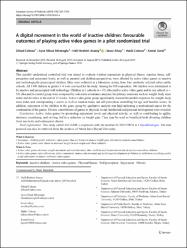A digital movement in the world of inactive children: favourable outcomes of playing active video games in a pilot randomized trial

View/
Date
2019Author
Çoknaz, DilşadMirzeoğlu, Ayşe Dilşad
Atasoy, Halil Ibrahim
Alkoy, Seval
Çoknaz, Hakki
Göral, Kemal
Metadata
Show full item recordAbstract
This parallel randomized controlled trial was aimed to evaluate whether parameters as physical fitness, reaction times, self-perception and enjoyment levels, as well as parental and children perspectives, were affected by active video games in inactive and technologically preoccupied children. Data were collected in a laboratory setting from four randomly selected urban public schools. All 1300 children in grades 3-6 were surveyed for the study. Among the 918 responders, 106 children were determined to be inactive and preoccupied with technology. Children in 3 schools (n = 53) allocated to active video game and in one school (n = 53) allocated to control group were compared by univariate covariance analyses for primary outcomes such as weight, body mass index and fat ratios at the end of 12 weeks. Active video game group significantly showed favourable responses for weight, body mass index and corresponding z scores as well as reaction times and self-perception controlling for age and baseline scores. In addition, enjoyment of the children in the game group by qualitative analysis was high indicating a motivational aspect for the continuation of the games. Diverse contributions of games to physical, social, intellectual and personal development were revealed. Conclusion: Active video games by promoting enjoyment levels and physical activity, as well as contributing to agility, alertness, socializing, and striving, led to a reduction in weight gain. They may be used as beneficial tools diverting children from inactivity and subsequent obesity. Trial registration: This study called AVGAME is registered with the number NCT03720938 in . The trial protocol can also be retrieved from the archives of Abant Izzet Baysal University.What is Known:center dot Nowadays, children prefer sedentary video games that are known to induce weight gain and obesity-related comorbidities.center dot Active video games were shown to decrease weight in overweight and obese children.What is New:center dot Active video games decrease weight increment and reaction times, thus could be used to prevent obesity in inactive non-obese children.center dot Active video games raise self-esteem, induce enjoyment, improve the personal and intellectual development of children in addition to socializing and is a safe alternative to indoor sedentary video games

















